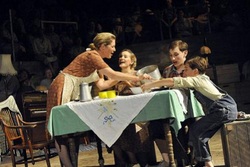 The Human Comedy at the Young Vic Photograph by Keith Pattison Galt trip: MacDermot's masterful Human Comedy gets revived in QueensPosted in Upstaged by Adam Feldman on Feb 15, 2011 at 3:25pm Manhattanites in search of good theater have grown accustomed to traveling to Brooklyn more than they used to. But recently, the Off-Off Broadway scene has started to get a foothold in Queens. For example, Long Island Theatre's Secret Theatre, home to the Queens Players, has earned notice for its wide range of new and classical productions. And then there is the Astoria Performing Arts Center, a modest outfit distinguished by its excellent taste in material. "I’m not coming at it from a ‘safe’ point of view," APAC artistic director Tom Wojtunik told an interviewer last year. "I start with the biggest vision and look for the story I want to tell." That ambition shines through in the company's programming choices, which are only getting bolder. APAC's tenth-anniversary season began in the fall with a revival of MilkMilkLemonade, Joshua Conkel's 2009 Off-Off Broadway sissy-farmboy parable. And now TONY has learned that the troupe will return in May with an ambitious staging of one of the greatest musicals you've probably never heard: Hair composer Galt MacDermot's deeply underrated The Human Comedy, a sweeping, homespun everyman epic that show-tune authority Ken Mandelbaum has called "the great American pop opera." Adapted from William Saroyan's neomythic novel, MacDermot's nearly through-sung musical debuted at the Public Theater in 1983, to mixed but generally appreciative reviews. Writing for the Times, Frank Rich noted that Saroyan and MacDermot shared "a rhapsodic, Whitmanesque vision of this country"; praising Wilford Leach's lean production, which unfolded on a nearly bare stage, he compared the production to Thornton Wilder's Our Town. "But Mr. MacDermot's music is far more sophisticated than the ambience suggests," Rich continued. "What usually prevents Saroyan's novel from becoming saccharine is its style: the riffs of language and the edgy, eccentric narrative events. The composer preserves that tone in his score, which is written in the true operatic manner, recitatives included. As befits Saroyan's pantheistic sense of community, the music is also highly eclectic: it encompasses gospel, jazz, swing, hymns, barbershop harmonies, blues and plaintive lullabies that almost might have been written by Woody Guthrie." Eight years later, in his indispensable Not Since Carrie, theater historian Mandelbaum seconded Rich's appreciation. "MacDermot's music, one of the most sophisticated scores of the last decade, combined country, forties swing, and classical lyricism into a wholly unique, original mixture," he wrote. "Saroyan's novel was a rich subject for American opera, and its musical version not only captured Saroyan's tone of sentimental sweetness perfectly, but actually gave the story more weight and made it more moving than it was in the novel or film. If [Bill] Dumaresq's lyrics were occasionally primitive, they lay well on MacDermot's finest score. Stylistically in a class by itself, it was a beautifully executed adaptation but probably too special a show to have ever succeeded on Broadway." And succeed on Broadway it did not. When the musical transferred from the Public to the Royale Theatre in the spring of 1984, it did not get the critical support that it deserved, and—lost in the shuffle of a busy season that also included Sunday in the Park with George, La Cage Aux Folles, The Rink, The Tap Dance Kid and Baby—it closed after just 13 performances. It was, in short, theCaroline, or Change of its day, and it received only a single Tony nomination: for Stephen Geoffreys as its central character, Homer. (Geoffreys's life since then has been an epic unto itself: After going on to star in the 1985 vampire flick Fright Night, he began a career slide that bottomed out in the mid-1990s when he appeared, under the pseudonym Sam Ritter, in a number of ultrashabby hardcore gay-porn videos.) In the past few years, however, The Human Comedy has been staging a comeback. After more than a decade on the shelf, a two-disk, two-hour cast album of the original production—whose cast included Rex Smith, Mary Elizabeth Mastrantonio and Olga Merediz (plus Donna Murphy and Cass Morgan in the chorus)—was finally released in 1997, correcting an injustice that Mandelbaum had lamented in print. MacDermot has been the subject of sustained renewed interest, with major recent revivals not only of 1967's Hair but also of his Tony-winning 1971 Two Gentlemen of Verona. And London's Young Vic mounted a full production of The Human Comedy in September, with 100 people in the cast, to launch its 40th season. Astoria Performing Arts Center's revival, directed by Wojtunik, runs from May 5 through May 21, and tickets are now on sale for just $18. Is The Human Comedy a show whose time has come? Take time to go to Queens and find out.
0 Comments
Your comment will be posted after it is approved.
Leave a Reply. |
Archives
June 2013
Categories
All
|

 RSS Feed
RSS Feed